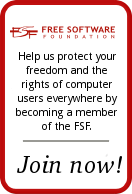The ISKME organization, a sponsor of the OER Commons is going to give some teachers a $1000 stipend as incentive to participate in creating an Open Educational Resource.
Get the details here:
http://www.iskme.org/what-we-do/projects/innovations/oer-commons#Fellowship
Jump! The deadline is tomorrow…sorry just heard about this today.
Opensource.com published an article today about an online public high school in Utah which embraces open source tools, open education resources and sounds very intriguing.
After finding out that it is a charter school and seeing the comment that home schoolers have been promoting this kind of thing for years, it made me wonder if those paths are the only way that open source and OER will happen in K12 education. Taking the leap to give individual control to teachers or even students doesn’t seem to be “the way” for public schools. We are tied to the norms of standardized testing instead.
http://opensource.com/education/10/9/open-source-goes-high-school?sc_cid=70160000000SrxUAAS
Posted by Algot Runeman under
Events | Tags:
programming contest |
Leave a Comment
Please pass this information along to everybody, especially the students.
Google is going to run a contest to get students involved in open source programming.
They are calling it “Google Code-in”
http://google-opensource.blogspot.com/2010/10/google-code-in-schools-out-codes-in.html
Even if your school isn’t running programming classes, there is a good chance you have some students who are learning to program on their own. Here’s a chance for the best of them to really advance their skills and open source community contacts.
I’m a collector of Internet links. My bookmarks file is big. The first time I access it each day, there is a noticeable delay. Today, I thought it might interest some of you to learn about some of the things that I look at. In many cases, I wish I’d written the articles because I agree with the content, while sometimes I don’t like what I’ve read. I’ll try to keep the links I mention at least marginally related to the open source world.
Here we go:
Copyright laws are weird.
Archiving old music may be illegal! Primary sources in sound are illegal to use.
http://arstechnica.com/tech-policy/news/2010/10/report-copyright-laws-put-americas-sound-heritage-at-risk.ars
Academic research requires access to journals which usually are available only at libraries of research-oriented institutions. Does that even make sense in the Internet-connected world?
http://www.insidehighered.com/blogs/library_babel_fish/the_great_disconnect_scholars_without_libraries
Every day, NASA gives us a photo and a clear, short article with many links to background about the topic of the photo. This is a wonderful resource for students and teachers.
http://apod.nasa.gov/apod/astropix.html
I love words. I look them up in dictionaries. I want to use them correctly and I’ve found knowing about the word history helps make that happen. “Etymology” is the word which describes word histories. I regularly use the Online Etymology Dictionary to get a quick sense of a word’s history.
http://www.etymonline.com/
